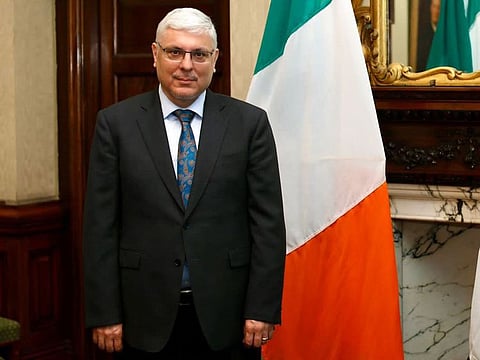Jaafar Al Sadr poised to become Iraq’s 7th post-Saddam Prime Minister
He is cousin of Moqtada Al Sadr, undisputed leader of Iraq’s Shiite community

Damascus: Before last year’s October elections, Iraqi MP Hakem Al Zameli warned: “If the premiership goes to any other than the Sadrist movement (which he represents in parliament), it means that the elections are rigged.”
Last month, his boss and patron Moqtada Al Sadr put those words to action, nominating his cousin and in-law, Jaafar Al Sadr, to replace the incumbent prime minister, Mustafa Al Kadhimi.
That was made possible after Al Sadr’s coalition, Sairioun, swept Iraq’s parliamentary elections in October 2021, winning the lion’s share of seats (73 out of 329). Al Sadr’s first move was making Zameli first deputy speaker of the Iraqi Parliament. Second on his target list is naming a Sadrist as Iraq’s new premier.
Since debuting on the Iraqi scene after the toppling of Saddam Hussein’s regime back in 2003, Al Sadr has gone from one milestone to another, establishing himself as the undisputed leader of Iraq’s Shiite community.
Starting out as a militia leader leading an insurgency against US forces, he shifted from bullets to ballots, taking part in every parliamentary election, which gave him representation both on the cabinet of ministers and in the Chamber of Deputies.
For 19 years, he has had the final say on naming and firing Iraqi premiers, the last among whom was Al Kadhimi, who came to office with Sadr’s blessing in May 2020.
But he has now taken that ambition a step further, wanting to secure the premiership for his cousin, Jaafar.
If he makes it to the job, Jaafar would be Iraq’s seventh premier since 2003. Previously, a relative of Moqtada and Jaafar, Sayyed Mohammad Hasan Al Sadr, had served as prime minister under the Iraqi monarchy from January to June 1948.
Who is Jaafar Al Sadr?
Born in December 1970, the 52-year-old Jaafar is the son of Mohammad Baqir Al Sadr, a ranking Shiite cleric who was arrested, tortured, and executed by Saddam back in 1980.
Jaafar’s father was the spiritual founder of the Dawa Party, which led the Shiite underground against Saddam, often with material and political support from Iran. It produced three of Iraq’s post-Saddam premiers, Ebrahim Al Jaafari (2005-2006), Nouri Al Maliki (2006-2014), and Haidar Abadi (2014-2018).
Jaafar studied under Ayatollah Mohammad Sadeq Al Sadr and in 1999, moved to Iran to study Islamic theology, then to Najaf, before obtaining an MA in sociology from the Lebanese University in Beirut. Briefly in 1998, he was arrested by Saddam, serving six months in jail.
In 2009, Jaafar became adviser to Iraqi president Jalal Talbani, one year before being elected to the Iraqi Chamber on the State of Law Coalition list, headed by then-Prime Minister Nouri Al Malki. In February 2011, he stepped down from Parliament, protesting “patronage and cronyism” in Iraq.
In April 2019, he became head of the department of international organisations at the Iraqi Foreign Ministry, before being appointed ambassador to London in October 2019.
He famously refused to join his father’s Dawa Party, arguing that after studying Islam he became convinced that religion and politics should be separated. Technically, he is a political independent, unaffiliated with any of the leading political parties.
Hurdles and challenges
Moqtada Al Sadr’s Sairoun bloc supports him, and so does his former boss, Nouri Al Maliki. The Coordination Framework of Iran-backed Shiite parties have not objected to his nomination, although it is an open secret that they were pushing for one of their own leaders, ex-Prime Minister Haidar Abadi, as Iraq’s next premier.
Most of the parties within the Coordination Framework, like Asa’ib Ahl Al Haq, Iraqi Hezbollah, and the Popular Mobilisation Units (PMU) hold Jaafar’s father in high esteem.
During a rare 2010 interview, Jaafar Al Sadr said that he does not believe in a religious state, nor in the Vilayet Al Faqih (Guardianship of Islamic jurist) system that has ruled Iran since 1979. He called instead for a civil government in Iraq, “closer to the British and German models.”
When asked about his relationship with Moqtada Al Sadr, Jaafar replied: “I have a lot of respect for him for his brave, patriotic stances, especially with regard to foreign presence.”
For him to become premier, Jaafar needs a majority vote in Parliament, or support of 165 out of 329 MPs. His cousin’s bloc will back him fully, and so will their allies in the Kurdistan Democratic Party (31 seats) and the Taqadum Party of Parliament Speaker Mohammad Al Halbousi (37 seats).
That’s still not enough to make him premier, however, meaning that Moqtada Al Sadr will have to reach out to heavyweight Shiite parties from the Coordination Framework, to secure his cousin’s appointment.
Al Maliki’s 33-man bloc will certainly help tip the balance in his favour, so will the Fateh Alliance of Hadi Al Ameri, who controls 17 seats in Parliament.
“He is acceptable by all Iraqi factions because of his father’s legacy,” said Harry Istepanian, an independent economic analyst and senior Fellow at the Iraqi Energy Institute.
Speaking to Gulf News, Istepanian explained that should Jaafar assume the premiership, “many doubt that he will stay in the position until the end of his term.”
Istepanian said: “He will inherit many unresolved issues with the Iranian backed militias, and most seriously the high unemployment rate among the youth and Iraq’s broken economy. His biggest mistake would be appointing unqualified ministers to satisfy the tripartite alliance that brought him to power. It will end his political career.”
Sign up for the Daily Briefing
Get the latest news and updates straight to your inbox



